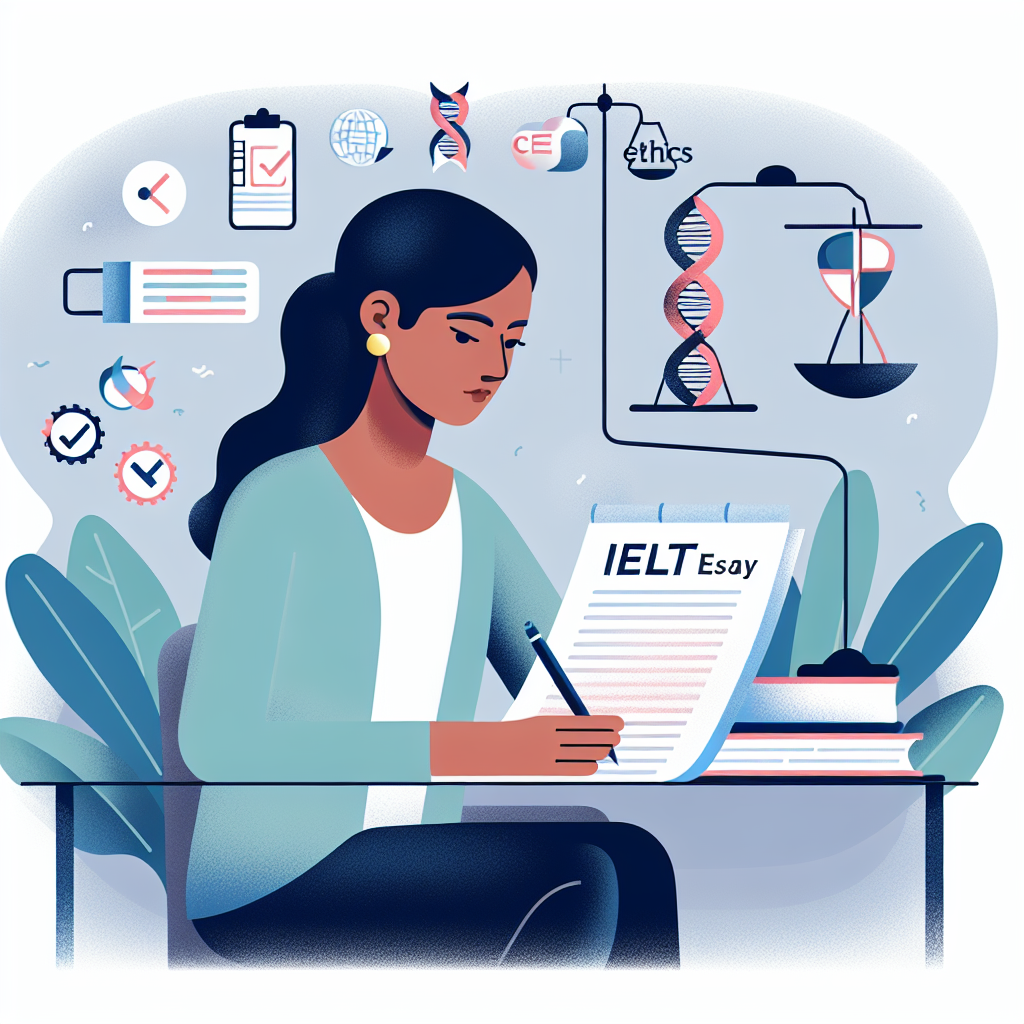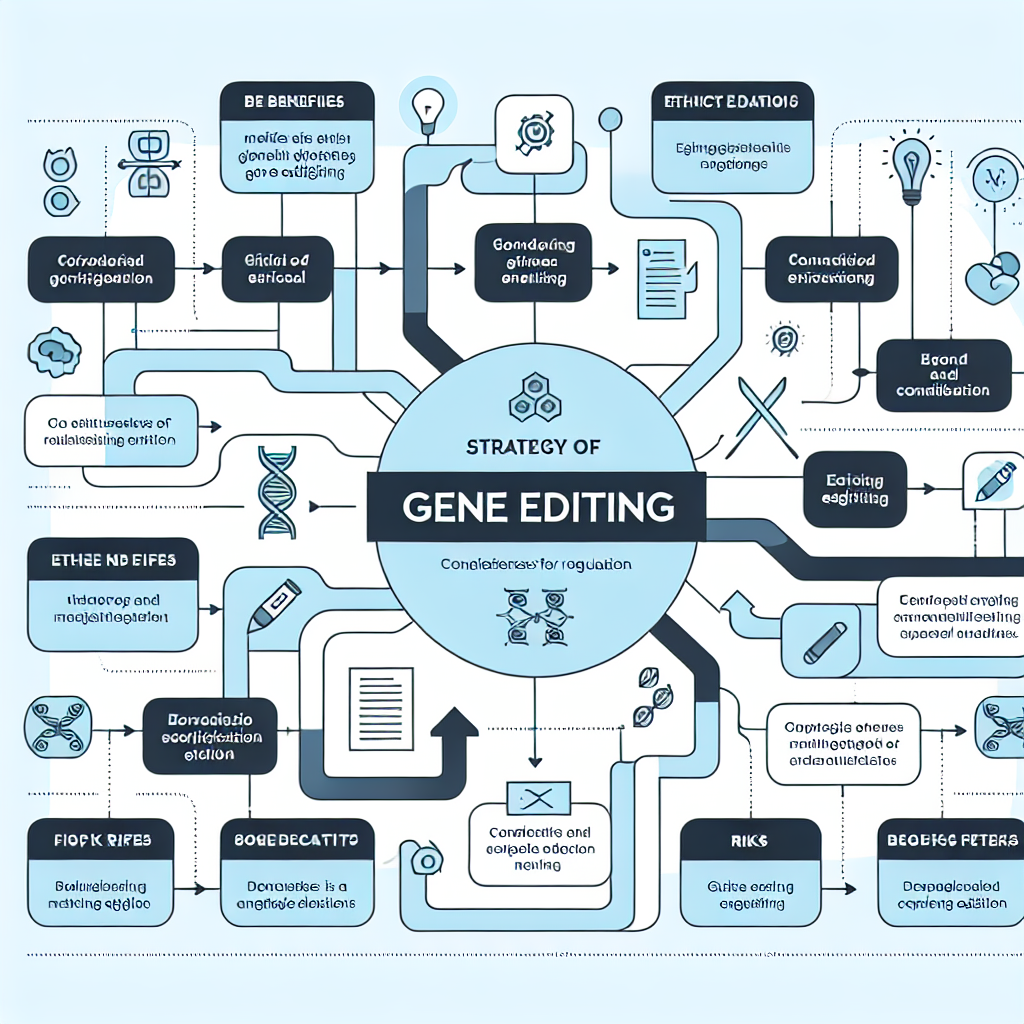Trong những năm gần đây, công nghệ chỉnh sửa gen (đặc biệt là CRISPR) liên tục xuất hiện trong đề thi IELTS Writing Task 2 dưới dạng các chủ đề về đạo đức khoa học, quản trị công nghệ và tác động xã hội. Với truy vấn tìm kiếm How To Manage The Ethical Implications Of Gene Editing, phần đông thí sinh kỳ vọng những ý tưởng, từ vựng và cấu trúc câu có thể áp dụng trực tiếp cho đề bài thật. Trong bài viết này, bạn sẽ nhận được: 3 bài mẫu hoàn chỉnh (Band 5-6, 6.5-7 và 8-9), phân tích chấm điểm theo 4 tiêu chí, danh sách từ vựng học thuật, cấu trúc câu ghi điểm cao, và checklist làm bài chiến lược.
Một số đề thi thực tế/đã được sử dụng làm bài luyện chính thức:
- Genetic engineering is an important issue in modern society. Some people think it will improve our lives, while others believe it poses serious risks. Discuss both views and give your own opinion. (Nguồn: IELTS Liz – Sample Questions)
- Some people believe genetically modified foods are a positive development, while others disagree. Discuss both views and give your opinion. (Nguồn: British Council – LearnEnglish practice)
- Human cloning is now possible. It is sometimes said that it is necessary for scientific progress, while others think it is dangerous. Discuss both sides and give your opinion. (Nguồn: IELTS-Blog.com – collected exam questions)
 Hình minh họa về how to manage the ethical implications of gene editing trong IELTS
Hình minh họa về how to manage the ethical implications of gene editing trong IELTS
1. Đề Bài và Phân Tích
Genetic engineering is an important issue in modern society. Some people think it will improve our lives in many ways, while others believe it poses serious ethical risks. Discuss both views and give your own opinion.
Dịch đề: Kỹ thuật di truyền là một vấn đề quan trọng trong xã hội hiện đại. Một số người nghĩ rằng nó sẽ cải thiện cuộc sống theo nhiều cách, trong khi những người khác tin rằng nó đặt ra những rủi ro đạo đức nghiêm trọng. Hãy thảo luận cả hai quan điểm và đưa ra ý kiến của bạn.
Phân tích đề bài:
- Dạng câu hỏi: Discuss both views and give your opinion (thảo luận hai phía + nêu quan điểm). Bạn cần cân bằng lập luận cho cả hai bên và chốt lại quan điểm cá nhân rõ ràng.
- Thuật ngữ quan trọng:
- Genetic engineering/gene editing: chỉnh sửa vật liệu di truyền (CRISPR là công cụ tiêu biểu).
- Ethical risks/implications: hệ quả đạo đức (phân biệt somatic vs germline, công bằng tiếp cận, đồng thuận thông tin, “dốc trơn” dẫn tới “designer babies”).
- Regulation/oversight: cơ chế quản trị, tiêu chuẩn, đánh giá rủi ro và giám sát.
- Lỗi thường gặp của học viên Việt Nam:
- Lệch chủ đề sang “GM foods” quá sâu, bỏ qua khía cạnh quản trị đạo đức.
- Quan điểm mơ hồ, thiếu tiêu chí đánh giá (ví dụ: consent, safety, equity).
- Lạm dụng ý cảm tính, thiếu ví dụ chính sách/khung quản trị cụ thể.
- Lỗi mạo từ (the), chia động từ số ít/số nhiều, và dùng từ vay mượn chưa chính xác.
- Cách tiếp cận chiến lược:
- Dùng cấu trúc phân tích rủi ro–lợi ích và trình bày “quản trị” như giải pháp trung hòa.
- Đưa ra khuyến nghị quản trị: moratorium có mục tiêu, thử nghiệm theo giai đoạn, hội đồng đạo đức độc lập, minh bạch dữ liệu, tham vấn cộng đồng.
- Chốt opinion rõ: ủng hộ phát triển có điều kiện, “safety-by-design” và “equitable access”.
 Sơ đồ chiến lược viết bài how to manage the ethical implications of gene editing
Sơ đồ chiến lược viết bài how to manage the ethical implications of gene editing
2. Bài Mẫu Band 8-9 cho chủ đề how to manage the ethical implications of gene editing
Giới thiệu: Bài Band 8-9 cần luận điểm sắc bén, phát triển ý mạch lạc, ví dụ thuyết phục và từ vựng học thuật chính xác, tự nhiên.
Bài luận (290–310 từ):
While breakthroughs in gene editing promise dramatic advances, they also expose fault lines in our moral landscape. Proponents stress that targeted therapies could eliminate inherited disorders, reduce health costs, and increase productivity. On this view, restricting research would be shortsighted: evidence-based regulation and robust clinical protocols can handle foreseeable risks, just as drug trials do.
Skeptics, however, warn of a slippery slope from therapy to enhancement, widening inequalities and commodifying human traits. They note that germline edits affect future generations who cannot consent. Moreover, leaving governance to voluntary guidelines risks regulatory arbitrage, where companies shop for lenient jurisdictions. These concerns are credible and require more than optimism.
In my view, the way forward is neither an open technological sprint nor a blanket ban, but a structured pathway that explicitly manages the ethical implications. First, a global baseline is needed: an independent, treaty-backed body should define red lines (e.g., non-medical enhancements, heritable edits outside compelling medical need) while enabling phased, somatic-only trials with transparent data sharing. Second, countries should adopt procedural safeguards: mandatory ethics review, public deliberation, and equitable access plans so that therapies do not become luxury goods. Third, adaptive regulation—time-limited approvals with continuous monitoring—can update rules as evidence accrues. Where uncertainty is profound, a targeted moratorium is justified, but it should be coupled with funded basic research, so caution does not become paralysis.
Ultimately, managing gene editing ethically is a governance problem, not a rhetorical one. If we align scientific ambition with informed consent, intergenerational justice, and distributive fairness, the technology can serve public health rather than market whims. The alternative—uninformed prohibition or uncritical enthusiasm—would both be ethically careless.
Phân Tích Band Điểm
| Tiêu chí | Band | Nhận xét |
|---|---|---|
| Task Response (Hoàn thành yêu cầu) | 8.5 | Trả lời đầy đủ cả hai quan điểm và nêu opinion rõ ràng. Đề xuất khung quản trị cụ thể (global baseline, phased trials, adaptive regulation). Lập luận có chiều sâu, dẫn chứng logic. |
| Coherence & Cohesion (Mạch lạc & Liên kết) | 8.5 | Mở–thân–kết rõ ràng; mỗi đoạn có chủ đề riêng; dùng từ nối học thuật tự nhiên; tiến triển ý từ lợi ích → rủi ro → giải pháp. Không lặp từ máy móc. |
| Lexical Resource (Từ vựng) | 8.5 | Vốn từ học thuật phong phú: slippery slope, regulatory arbitrage, intergenerational justice, distributive fairness. Collocations chuẩn, dùng chính xác, không gượng ép. |
| Grammatical Range & Accuracy (Ngữ pháp) | 8.0 | Câu phức, mệnh đề quan hệ, đảo ngữ tinh tế; dấu câu chuẩn. Có vài câu dài nhưng kiểm soát tốt; không lỗi ngữ pháp đáng kể. |
Tại Sao Bài Này Đạt Điểm Cao
- Nêu khung giải pháp ba lớp: chuẩn toàn cầu, bảo đảm thủ tục, quy định thích ứng.
- Dùng cặp khái niệm đạo đức: intergenerational justice, informed consent, equity.
- Tránh cực đoan: không “mở cửa hoàn toàn” cũng không “cấm tuyệt đối”.
- Collocations học thuật tự nhiên: treaty-backed body, red lines, targeted moratorium.
- Liên kết ý thông minh: từ rủi ro → cơ chế giảm thiểu → điều kiện áp dụng.
- Ngôn ngữ “policy-oriented” đúng trọng tâm quản trị đạo đức.
- Kết luận khái quát, đẩy luận điểm về “governance problem”.
3. Bài Mẫu Band 6.5-7 cho chủ đề how to manage the ethical implications of gene editing
Giới thiệu: Band 6.5-7 có luận điểm rõ, ví dụ phù hợp, ngôn ngữ khá chính xác, nhưng phạm vi từ vựng/độ tinh tế hạn chế hơn, đôi chỗ khái quát.
Bài luận (255–275 từ):
Gene editing can bring medical benefits, but it also causes serious worries. Supporters point out that it may cure genetic diseases and save money for health systems in the long term. They often argue that strict rules and clinical testing are enough to keep the public safe.
However, opponents are concerned about ethics. If parents can choose traits for their children, society may become unfair, and rich people could buy advantages. Also, when edits pass to future generations, there is no real consent. In addition, companies might move to countries with weak laws to do risky experiments.
In my opinion, we should not ban gene editing completely, but we must manage it carefully. Governments should set clear national laws that follow international guidelines, at least for medical purposes. At the same time, there should be public discussions so people understand what is allowed and why. Finally, new treatments should include access plans for low-income patients; otherwise, the technology will increase inequality.
To conclude, the best way is a middle path: allow research and therapies that are safe and necessary, but prohibit non-medical enhancements and protect future generations. In this way, society can enjoy the benefits while reducing the risks.
Phân Tích Band Điểm
| Tiêu chí | Band | Nhận xét |
|---|---|---|
| Task Response (Hoàn thành yêu cầu) | 7.0 | Bao quát đủ hai phía, có opinion rõ và giải pháp cơ bản (luật quốc gia, thảo luận công chúng, kế hoạch tiếp cận). Thiếu chiều sâu kỹ thuật so với Band 8-9. |
| Coherence & Cohesion (Mạch lạc & Liên kết) | 7.0 | Bố cục hợp lý; câu nối đơn giản nhưng hiệu quả. Một vài ý còn khái quát, chưa có ví dụ chính sách cụ thể. |
| Lexical Resource (Từ vựng) | 6.5 | Từ vựng phù hợp nhưng chưa đa dạng (rules, laws, discussions). Thiếu một số collocations học thuật nâng cao. |
| Grammatical Range & Accuracy (Ngữ pháp) | 7.0 | Câu phức ở mức vừa; ít lỗi ngữ pháp. Có thể mở rộng cấu trúc nâng cao để tăng điểm. |
So Sánh Với Bài Band 8-9
- Band 8-9 có khung quản trị chi tiết (treaty-backed, adaptive regulation, moratorium có mục tiêu), còn Band 6.5-7 chỉ dừng ở “luật quốc gia” và “thảo luận công chúng”.
- Vốn từ Band 8-9 đa dạng và chuẩn xác; Band 6.5-7 dùng từ chung chung hơn.
- Liên kết lập luận ở Band 8-9 tiến bộ theo tầng; Band 6.5-7 ít lớp hơn, ít thuật ngữ chuyên sâu.
4. Bài Mẫu Band 5-6 cho chủ đề how to manage the ethical implications of gene editing
Giới thiệu: Band 5-6 thường có ý chính rõ nhưng phát triển chưa sâu; dễ mắc lỗi mạo từ, thì, giới từ, collocations chưa tự nhiên; ví dụ thiếu sắc nét.
Bài luận (255–265 từ):
Many people think gene editing is good because it can fix diseases, but other people think it is dangerous for ethics. On the positive side, doctors can use it to make patients more healthy and reduce the costs for hospital. If we just make some rules, then science will be safe enough.
On the negative side, this technology can be misused by companies who only want profit. Some parents may try to create a designer child, which is unfair to others and to the society. Also, it will be a problem for the future generation who does not agree with those edits.
In my view, we should not stop it totally because it has many benefits for medicine. But government need to control it better, for example, ask for permissions from committees and make companies share data. There should be a pause for dangerous experiments, but we still continue other parts. If we do like this, we can protect people and also develop technology at the same time.
To sum up, gene editing has both advantages and disadvantages, and we must manage it by having rules and education to the public.
Phân Tích Band Điểm
| Tiêu chí | Band | Nhận xét |
|---|---|---|
| Task Response (Hoàn thành yêu cầu) | 6.0 | Trả lời hai phía và có opinion, nhưng lý lẽ còn chung chung, thiếu tiêu chí quản trị cụ thể. |
| Coherence & Cohesion (Mạch lạc & Liên kết) | 6.0 | Chia đoạn đúng; từ nối đơn giản; có lặp ý; phát triển luận điểm còn mỏng. |
| Lexical Resource (Từ vựng) | 5.5 | Collocations chưa tự nhiên: more healthy, the costs for hospital. Thiếu thuật ngữ học thuật chính xác. |
| Grammatical Range & Accuracy (Ngữ pháp) | 5.5 | Lỗi S-V (does not), mạo từ, số nhiều; cấu trúc câu đơn giản, ít câu phức. |
Học Từ Những Lỗi Sai
| Lỗi sai | Loại lỗi | Sửa lại | Giải thích |
|---|---|---|---|
| more healthy | Collocation | healthier | Dùng tính từ so sánh đúng: healthy → healthier. |
| the costs for hospital | Giới từ/mạo từ | hospital costs / healthcare costs | Dùng collocation tự nhiên; “for” không phù hợp, mạo từ “the” không cần. |
| some rules | Từ vựng mơ hồ | robust regulations / clear regulatory standards | Dùng cụm học thuật cụ thể hơn. |
| does not agree | S-V | do not agree | “future generations” (số nhiều) → “do”, không phải “does”. |
| stop it totally | Diễn đạt | impose a blanket ban | Collocation tự nhiên trong ngữ cảnh chính sách. |
| ask for permissions | Danh từ đếm được | obtain permission | “Permission” thường không đếm được trong ngữ cảnh chung. |
| to the public | Giới từ | public education / educate the public | Cấu trúc tự nhiên hơn trong chính sách. |
Cách Cải Thiện Từ Band 6 Lên Band 7
- Nâng cấp từ vựng: thay “some rules” bằng “independent ethics review, phased trials, public reporting”.
- Bổ sung tiêu chí đánh giá: consent, safety thresholds, equitable access.
- Sử dụng câu phức với mệnh đề phụ thuộc và mệnh đề quan hệ để tăng phạm vi ngữ pháp.
- Thêm ví dụ/policy cụ thể: targeted moratorium on germline edits; treaty-backed oversight.
- Kiểm tra lỗi cơ bản: mạo từ, S-V, giới từ.
5. Từ Vựng Quan Trọng cho how to manage the ethical implications of gene editing
| Từ/Cụm từ | Loại từ | Phiên âm | Nghĩa tiếng Việt | Ví dụ (tiếng Anh) | Collocations |
|---|---|---|---|---|---|
| gene editing | n. | /dʒiːn ˈedɪtɪŋ/ | chỉnh sửa gen | Gene editing can target specific mutations. | gene-editing tools/techniques |
| germline | n./adj. | /ˈdʒɜːmlaɪn/ | dòng mầm (di truyền) | Germline edits affect future generations. | germline modification/editing |
| somatic | adj. | /səˈmætɪk/ | thuộc tế bào thân | Somatic therapies do not pass to offspring. | somatic cell therapy |
| ethical oversight | n. | /ˈeθɪkəl ˈəʊvəsaɪt/ | giám sát đạo đức | Ethical oversight must be independent. | robust/independent oversight |
| regulatory framework | n. | /ˌreɡjʊˈleɪtəri ˈfreɪmwɜːk/ | khung pháp lý | A clear regulatory framework reduces risks. | comprehensive/clear framework |
| informed consent | n. | /ɪnˌfɔːmd kənˈsent/ | đồng thuận thông tin | Patients must give informed consent. | obtain/ensure informed consent |
| equitable access | n. | /ˈekwɪtəbəl ˈækses/ | tiếp cận công bằng | Policies should ensure equitable access. | ensure/promote equitable access |
| slippery slope | n. | /ˌslɪpəri ˈsləʊp/ | dốc trơn (ẩn dụ) | Enhancement may lead to a slippery slope. | avoid/recognize a slippery slope |
| regulatory arbitrage | n. | /ˌɑːbɪtrɑːʒ/ | lách luật theo vùng | Firms may engage in regulatory arbitrage. | prevent/enable arbitrage |
| moratorium | n. | /ˌmɒrəˈtɔːriəm/ | tạm hoãn | A targeted moratorium may be needed. | impose/lift a moratorium |
| stakeholder | n. | /ˈsteɪkˌhəʊldə/ | bên liên quan | Stakeholders should be consulted early. | engage/consult stakeholders |
| public deliberation | n. | /ˈpʌblɪk dɪˌlɪbəˈreɪʃn/ | tham vấn công chúng | Public deliberation builds social trust. | meaningful/broad deliberation |
| precautionary principle | n. | /prɪˈkɔːʃənəri ˈprɪnsəpl/ | nguyên tắc phòng ngừa | Apply the precautionary principle when evidence is limited. | apply/invoke principle |
| unintended consequences | n. | /ˌʌnɪnˈtendɪd ˈkɒnsɪkwənsɪz/ | hệ quả ngoài ý muốn | Policies must anticipate unintended consequences. | anticipate/mitigate consequences |
| social license | n. | /ˈsəʊʃl ˈlaɪsns/ | chấp thuận xã hội | Transparency helps secure a social license to operate. | secure/maintain social license |
6. Cấu Trúc Câu Điểm Cao
- Câu phức với mệnh đề phụ thuộc
- Công thức: Mệnh đề chính + liên từ phụ thuộc (although/while/because/if) + mệnh đề phụ.
- Ví dụ: While breakthroughs in gene editing promise advances, they also expose fault lines in our moral landscape.
- Vì sao ghi điểm: Tạo đối lập tinh tế, thể hiện khả năng cân bằng ý.
- Ví dụ bổ sung:
- Although evidence is limited, regulators must act prudently.
- Because germline edits are heritable, stricter rules are justified.
- Lỗi thường gặp: Dùng while/whereas sai ngữ cảnh, thiếu dấu phẩy hợp lý.
- Mệnh đề quan hệ không xác định (non-defining relative clause)
- Công thức: Danh từ + , which/whose/who…, + mệnh đề bổ sung.
- Ví dụ: Adaptive regulation, which updates rules as evidence accrues, can prevent harm.
- Vì sao ghi điểm: Bổ sung thông tin mượt mà, tăng độ học thuật.
- Ví dụ bổ sung:
- These safeguards, which are internationally recognized, build trust.
- Germline changes, whose impacts are long-term, require caution.
- Lỗi thường gặp: Quên dấu phẩy; dùng “that” cho mệnh đề không xác định.
- Cụm phân từ (participial phrases)
- Công thức: V-ing/V-ed + cụm bổ nghĩa, mệnh đề chính.
- Ví dụ: Leaving governance to voluntary guidelines, policymakers risk regulatory arbitrage.
- Vì sao ghi điểm: Cô đọng và liên kết nguyên nhân–kết quả.
- Ví dụ bổ sung:
- Facing profound uncertainty, committees may impose a moratorium.
- Designed with equity in mind, policies can reduce disparities.
- Lỗi thường gặp: Treo chủ ngữ (dangling modifier).
- Câu chẻ (Cleft sentences)
- Công thức: It is/was + X + that/who + mệnh đề.
- Ví dụ: It is a global baseline that will separate necessary therapy from risky enhancement.
- Vì sao ghi điểm: Nhấn mạnh điểm trọng tâm.
- Ví dụ bổ sung:
- It is informed consent that underpins ethical practice.
- It was public deliberation that shifted policy.
- Lỗi thường gặp: Lạm dụng gây nặng nề; chọn thông tin nhấn chưa hợp lý.
- Câu điều kiện nâng cao (mixed/third conditionals)
- Công thức: If + past perfect, … would + V (now); hoặc biến thể.
- Ví dụ: If governance had been stronger, companies would be less tempted to relocate today.
- Vì sao ghi điểm: Linh hoạt về thời; suy tư giả định sắc sảo.
- Ví dụ bổ sung:
- If evidence were clearer, a moratorium would be unnecessary.
- If access is not ensured, benefits will concentrate among the rich.
- Lỗi thường gặp: Sai thì trong mệnh đề điều kiện; trộn lẫn chưa logic.
- Đảo ngữ (Inversion) nhấn mạnh
- Công thức: Only by/Not until/Never + trợ động từ + S + V.
- Ví dụ: Only through adaptive regulation can society balance innovation and ethics.
- Vì sao ghi điểm: Tạo nhấn mạnh tự nhiên, tăng độ tinh luyện.
- Ví dụ bổ sung:
- Never has the need for ethics been more urgent.
- Not until equity is addressed will public trust grow.
- Lỗi thường gặp: Thiếu đảo trợ động từ; đặt trạng từ nhấn sai vị trí.
7. Checklist Tự Đánh Giá
Trước khi viết:
- Gạch chân từ khóa: genetic engineering, ethical risks, discuss both views, opinion.
- Chọn dàn ý 4 đoạn: intro – view A – view B + opinion – solution-focused conclusion.
- Xác định tiêu chí đạo đức: consent, safety, equity, intergenerational justice.
Trong khi viết:
- Mỗi đoạn 1 ý chính + ví dụ/giải thích.
- Dùng cấu trúc câu đa dạng (ít nhất 1–2 câu phức/đoạn).
- Kiểm soát từ vựng học thuật vừa phải, tự nhiên.
Sau khi viết:
- Soát mạo từ (a/an/the), S-V, số nhiều, giới từ.
- Cắt bớt lặp từ: use synonyms, pronouns, substitution.
- Kiểm tra số từ: 260–320 từ; không dưới 250.
Mẹo quản lý thời gian:
- 5 phút lập dàn ý; 30 phút viết; 5 phút soát lỗi.
- Ưu tiên rõ ràng ý trước, làm đẹp câu sau.
- Dùng khung lập luận cố định: benefits → risks → governance solutions.
[internal_link: IELTS Writing Task 2 cách viết mở bài]
[internal_link: Từ vựng chủ đề Khoa học Công nghệ]
Kết bài
Chủ đề how to manage the ethical implications of gene editing thường đòi hỏi bạn không chỉ kể lợi–hại mà còn trình bày khung quản trị: chuẩn toàn cầu, giám sát độc lập, thử nghiệm theo giai đoạn, minh bạch và công bằng tiếp cận. Bạn đã có 3 bài mẫu theo ba mức band, phân tích chấm điểm, từ vựng học thuật và 6 cấu trúc câu ghi điểm cao. Con đường cải thiện thực tế: luyện dàn ý theo khung governance, nâng cấp collocations, và kiểm soát lỗi cơ bản. Hãy viết lại đề bài hôm nay theo dàn ý của bạn, đăng trong phần bình luận lớp học, và nhận phản hồi từ cộng đồng. Với thực hành đều đặn 3–4 bài/tuần trong 4–6 tuần, bạn có thể tăng 0.5–1.0 band một cách bền vững. Tham khảo thêm các chủ đề cùng nhóm như công nghệ AI, dữ liệu cá nhân, và GM foods để mở rộng vốn từ và mô hình lập luận.



[…] Để hiểu sâu khía cạnh đạo đức song hành với lập luận chính sách, bạn có thể tham khảo một phân tích nền tảng về how to manage the ethical implications of gene editing: https://vn.ielts.net/how-to-manage-the-ethical-implications-of-gene-editing/ […]